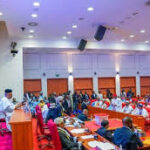Prime Minister Keir Starmer’s government has announced plans to acquire at least 12 F-35A fighter jets capable of carrying tactical nuclear weapons, in what officials describe as the most significant shift in the UK’s nuclear posture in a generation.
The plan, which will be formally unveiled by Starmer at the NATO summit in The Hague on Wednesday, marks a major evolution in Britain’s defence strategy. It will be the first time since the Cold War that UK aircraft are equipped to deliver nuclear weapons, reintroducing a dual-platform deterrent to complement the country’s submarine-based nuclear arsenal.
“In an era of radical uncertainty, we can no longer take peace for granted,” Starmer said in a statement from Downing Street. “These F-35 dual-capable aircraft will herald a new era for our world-leading Royal Air Force and deter hostile threats that endanger the UK and our Allies.”
The F-35A, produced by U.S. defence firm Lockheed Martin, is used by several NATO members, including the U.S., Germany, and Italy. Unlike the F-35B variant currently operated by the UK, the A model can be equipped with B61 nuclear warheads under NATO’s “nuclear sharing” arrangement.
The jets will be based at RAF Marham in Norfolk. Their acquisition is expected to boost the UK’s defence industry, supporting an estimated 20,000 jobs. Britain is already a key contributor to the F-35 program, manufacturing around 15% of the jet’s global components.
NATO Secretary-General Mark Rutte welcomed the decision, calling it “yet another robust British contribution to NATO” as the alliance prepares to raise its defence spending target from 2% to 5% of GDP amid rising geopolitical tensions, particularly due to Russia’s aggression.
The UK has pledged to meet the new target and recently announced major investments in naval capabilities and domestic weapons production. The move comes in response to past criticism from the U.S., especially under former President Donald Trump, who accused European allies of underfunding NATO.
Germany is also increasing its defence posture, with Chancellor Friedrich Merz pledging to build “Europe’s strongest conventional army” through higher military spending.
With the return of air-delivered nuclear capabilities, Britain joins a growing list of NATO countries enhancing their deterrence strategies, signalling a renewed focus on Cold War-era readiness in response to evolving global threats.









